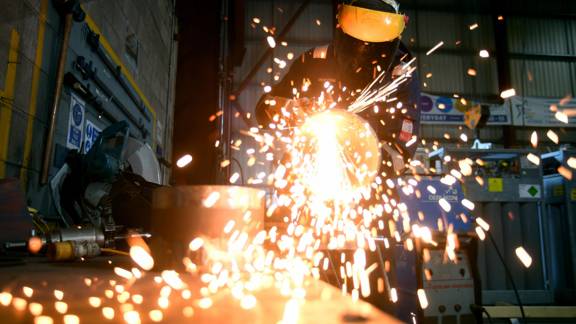Digital heat: how to increase energy efficiency and reduce fuel poverty
29 Sep 2025 • 5 minute read
Innovative companies in Scotland are decarbonising heating and lowering bills for businesses and households.

In Scotland, nearly 25% of households are affected by fuel poverty. Innovative Scottish companies are using emerging technologies to address this critical challenge.
While physical solutions – like the manufacture and installation of heat pumps – are a key part of decarbonising heat, the importance and potential of digital solutions shouldn’t be underestimated.
In Scotland, there are around seventy companies that offer innovative, tech-based clean heat solutions. These range from using AI to boost energy efficiency, to getting tailored advice based on your postcode.
Here are just some of the solutions that aim to reduce fuel poverty in Scotland and support the country’s net zero ambitions.
Using AI to boost energy efficiency
Edinburgh-based UrbanTide has delivered a platform that identifies communities at risk of fuel poverty.
The company was founded by Simon Tricker and Stevie Revill and operates from the Bayes Centre at the University of Edinburgh.
The company’s platform uZero – created with support from the Modernising Energy Applications Programme from Innovation UK – analyses energy data from multiple sources, including smart meters. From this, it delivers vital insights to help local authorities, housing associations, and energy companies target retrofit grants.
The platform can also create a ‘digital twin’ of communities. These include street-level heat map visualisations that update every month. Using this data, uZero can predict potential future risk zones and identify existing areas of fuel poverty.
This solution from UrbanTide is just one example of how digital technology can address crucial heat issues, and the results speak for themselves. uZero has already increased referral rates for retrofit grants from 1% to 34% in parts of the UK.
Thermal surveys to identify energy efficiency gaps
Thermal surveys have been used to identify energy efficiency gaps in buildings for many years - but the traditional manual processes of this can take time.
Scottish company IRT Surveys is speeding up this process with AI. The Dundee-based company has been conducting thermal surveys for more than 20 years, but has recently added AI capabilities.
One of these is a data platform that allows the company to model retrofits – mainly of social housing – and measure their thermal performance.
Retrofit funding access for homeowners
Scotland has a unique challenge to make its homes more energy efficient. This is due in part to its many historic buildings, such as tenement flats, which can’t accommodate physical solutions like heat pumps.
It’s in the interest of residents – both from a cost and environmental perspective – to make their homes more energy efficient. However, knowing what measures to take can be difficult, and taking them can be expensive.
Edinburgh-based Snugg offers an alternative solution to these costly and confusing measures. Its smart platform suggests simple and affordable measures to improve energy efficiency in the home. All users have to do is enter their postcode.
The platform also shows homeowners how to access finance options and low-interest loans for energy efficiency upgrades. Its AI-powered chatbot offers advice, connects homeowners with community groups, and provides contact details of trusted contractors nearby.
As well as this, Snugg is rolling out a remarkable innovation: the ‘carbon cashback’ system. This allows homeowners to make money from their carbon savings by connecting them with businesses looking to offset their own carbon emissions. Essentially, the businesses ‘buy’ the carbon savings from the homeowners.
Why Scotland is the place to develop clean heat technologies
For the world to meet its climate targets, collaboration is key. With a heritage of energy innovation and connected ecosystem, Scotland is uniquely placed to develop clean heat solutions.
Here, academia, government, and industry work together to facilitate innovation, offering a host of opportunities to partner with world-class institutions and specialists.
Snugg collaborated with the carbon economics team at the University of Edinburgh Business School to develop its ‘carbon cashback’ scheme. The company is also part of FinTech Scotland, which facilitates cooperation, support, and collaboration between Scottish financial institutions and universities.
This kind of collaboration cooperation is supported by the concentration of highly skilled data scientists and engineers from Scotland’s world-renowned universities. For example, IRT worked with Robert Gordon University to develop the AI capabilities now being used at the company. IRT also worked with The Data Lab, Scotland’s innovation hub for data science and AI.
An environment for growth
While the scale of the challenge to decarbonise heat is great, digital innovations like those above are making a significant impact.
Scotland is an ideal place to develop solutions in clean heat and beyond. Creativity, innovation, and ambition are cultivated with support from companies like Scottish Enterprise.
If you’d like to know more about the clean heat opportunity in Scotland, head to the Scottish Enterprise website.
You might also be interested in
-
Low carbon heat opportunities
Take a closer look at some of the low carbon heat projects underway in Scotland and explore the benefits of setting up your low carbon business here.
-
Pioneering heat pump projects
The scale of the low carbon heat opportunity in Scotland is enormous, with mass installation of heat pumps and the roll-out of low carbon heat networks projected to boom over the next decade.
-
Mitsubishi develops low carbon heat pumps in Scotland
To meet demand for low carbon heat pumps, Mitsubishi will invest £15.3 million in its Livingston manufacturing facility.
Get the latest updates from Scotland
Got a question?
We’re always ready to help. Send us an enquiry, or give us a call.
